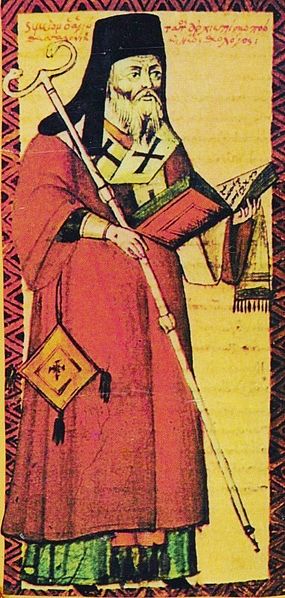
A few weeks ago I saw something and I thought to myself that I would have to share it just because it was truly noteworthy. As many can tell, Catholics are continually talking about how questions of infallibility and indefectibility pertain to the Bishop of Rome. More traditionally minded Catholics are trying as hard as they can to become infallible-minimalists, i.e. they realize a far more narrow conditioning of the mode of infallibility is preferable in light of how much they disagree with the Papacy over the last 50 years. So in discussion with a very trad-minded friend, I quoted the below citation (it is actually famous), and inquired of his thoughts:
“When the Latins say that the bishop of Rome is first, there is no need to contradict them, since this can do no harm to the Church. They must only show that he has the same faith as Peter and his successors … and that he possesses all that came from Peter, then he will be the first, the chief and head of all, the supreme high priest… All these qualities have been attributed to the patriarchs of Rome in the past. We will say that his See is apostolic, and he who occupies it is said to be the successor of Peter, as long as he professes the true faith. No one who thinks and speaks truth would dare deny this. That the Bishop of Rome profess only the faith of Silvester, Agatho, Leo, Liberius, Martin, and Gregory, we would proclaim him first among all other high priests, and we will submit to him not simply as to Peter but as to the Savior Himself. But if he is not successor in the faith of these saints, nor is he successor of the throne. Not only is he not apostolic, neither is he first, nor Father, but he is an adversary and devastator and enemy of the Apostles.”
The trad-friend heartily agreed with this statement. I’m not sure if he knew once he read it, but I then said that this was actually said by a 15th century Greek Orthodox monk and theologian Symeon, Archbishop of Thessaloniki (1381-1429), who was not in communion with Rome precisely because of its “errors”. He then said that the monk was wrong on doctrine, and didn’t properly understand the doctrine of the Filioque.
And so on. But this exchange illustrated something profound to me. Some Catholics are willing to have the same understanding that the Byzantine Orthodox had about Rome in the years following the 11th-13th century disputes, only with respect to contemporary Rome (since the 2nd Vatican Council). And yet, where the Byzantine Orthodox thought it was only logical to break religious fellowship with those whom they deemed “heretical”, the trad-Catholics still uphold the invinciblility of the Roman communion for eternal salvation. The former maintains this view that ecclesiastical communion has the criteria of a shared faith, sacramental economy, and mutual recognition of orthodox bishops, whereas the latter maintains this view of ecclesiastical communion where the loss of agreement in faith still maintains the forge of unity.
Let that sink in.

Brother Erick,
I don’t believe that if a Trad happens to agree with Bp. Symeon of Thessaloniki on this point it is because he departs from Vatican I or even Vatican II, nor does it mean he disregards the rightful authority of the pope per se. Bp. Symeon’s idea of a true pope is probably not resembling the Trad notion because all Trads (let’s presume) accept defined dogmas related to the papacy, the magisterial weight of statements related to the papacy, and Vatican I. I would also say they (mostly) even accept Vatican II as an Ecumenical Council, but that Chalcedonesque controversy is making the waters muddy on various issues related to the council, and that therefore the context of Bp. Symeon’s quote doesn’t really mean much in the grand scheme of a 21st century controversy. After all, the pope doesn’t have the authority to do whatever he likes and there is room for “infallible-minimalist” perspective provided there is still “infallible.” It seems like an unsettled question which can only be solved at a future time which we will all be found to have at least veered slightly from reality at some point.
God bless you,
Dylan
Symeon sees the Apostolic See as excluded from the pachcal mystery through heresy. That is what every Christians in the 1st millennium understood to be a lampstand being removed from a local church. If Catholicism is not falsified by that, then I wouldn’t know what would. And if there is no criterion of falsification, then what is the criterion of proof?
Erick, do you have any posts that more throughly address this “yes, the Pope is first, but only if he’s Orthodox” objection posed by the Orthodox? It’s tempting to think the objection bottoms out to a discussion of the Filioque – I think this is true to an extent – but surely there’s a way to address the objection more directly? Is the objection ultimately a discussion of what one does with a heretical pope? If so, this seems to be an unresolved issue in Catholicism, correct?
Simply put, is being the Rock qua person inseparable from being the Rock qua witness? Is Peter the man and Peter’s faith separable? They seem to be conjunctive.
As always, I look forward to reading your thoughts!